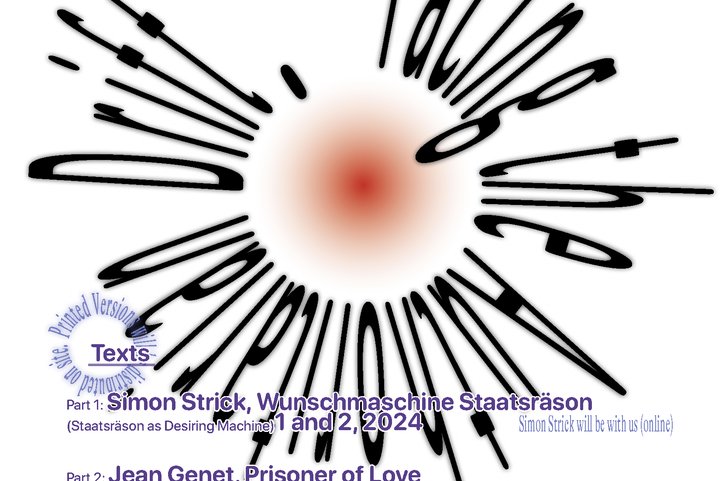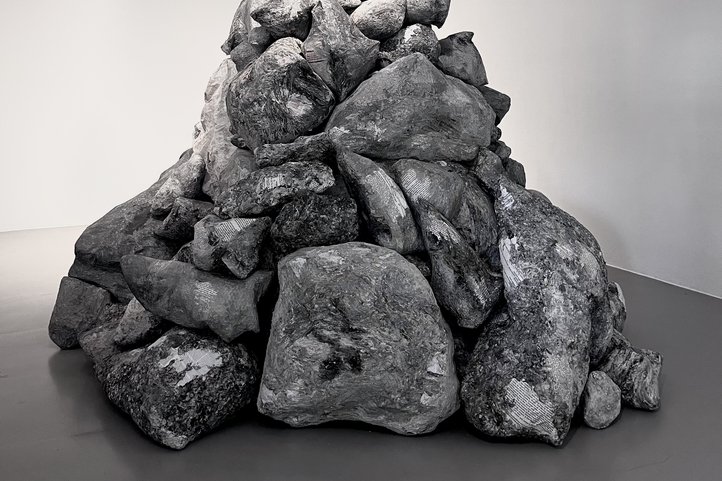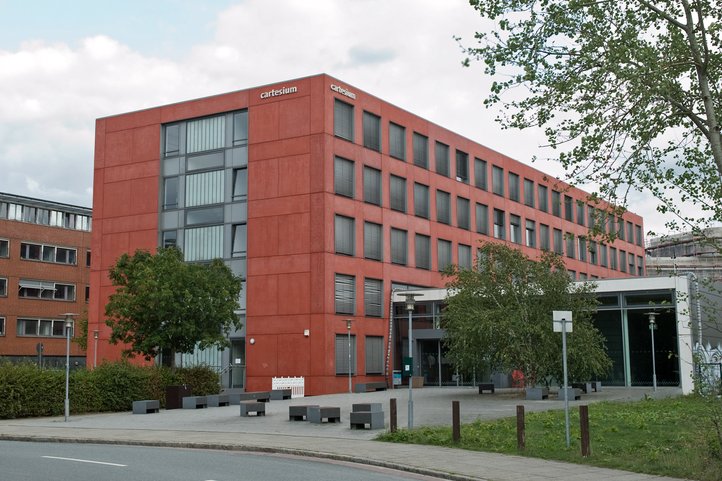
Prof. Asli Serbest
- Study programme Digitale Medien, Freie Kunst, Integriertes Design
- Email asli.serbest@hfk-bremen.de
- Website http://aslimona.xyz
Vita
Asli Serbest works in collaborations across spatial, image, sound, and text practices. Her processed-based projects evolve into installations, objects, temporary spaces, videos, sound, and texts. They play and replay architecture histories, events, and movements, with the aim to rethink the production of space and implied power relations.
Following their feminist constitution these projects propose themselves less as fixed spaces and objects than as physical or digital versions that share an interest in variation and distortion of form and scale.
Asli Serbest has been a professor teaching in the architecture and art fields at Stuttgart State Academy of Art and Rhode Island School of Design, among others. After her studies in Istanbul, she completed her doctorate on speculative spatial strategies and a critique of Modernism.
She publishes and exhibits internationally, among others at Biennale di Venezia, Württembergischer Kunstverein Stuttgart, Riverrun Istanbul, Pinakothek der Moderne München, Storefront for Art and Architecture New York, Pera Museum Istanbul, HKW Berlin, Vancouver Art Gallery, Künstlerhaus Stuttgart, New Museum New York; in e-flux journal, Volume Magazine, Perspecta, The Gradient-Walker Art Center, Istanbul Art News, AArchitecture, Deutschlandfunk, etc.
Asli Serbest is the co-editor of Junk Jet, an independent magazine on art, architecture, and media.
In 2019, she co-curated the 7th International Sinop Biennial 2019 under the title of “A Politics of Location” —an exhibition based on situated practices and contextual processes in the Anatolian Black Sea region.
Current courses
- Mentoring bei Asli Serbest In continuously offered individual meetings, students will have the opportunity to discuss their ongoing projects and address diverse questions related to their studies. These sessions aim to support the development of their practice from conception to realization. In addition, students are encouraged to reach out whenever they have questions or concerns. ---
- Artistic Research / Artistic PhD The class offers an introduction to artistic research practices and provides an overview of the artistic PhD program at the HfK Bremen. Participants will have the opportunity to explore various approaches to artistic knowledge production and reflect on their own positions within research-based practices. The focus is on actively participating in the “PhD Colloquium” on January 15, where participants engage with ongoing PhD projects and contribute their own perspectives. An additional session (to be announced later) will offer space to share and discuss individual research questions. Dates of the class: 15.01.2026 starting from 10 am and an additional session. --- A collaboration with Anna Rubin, internationally renowned kite maker from based in Austria. https://www.annarubin.at Our teaching areas are interwoven in an interdisciplinary manner in the design process. The course is open to all study programmes. Ms. Rubin will travel from Klagenfurt for two kite-making workshops. THE PROJECT Our desire as humans to fly is the main force behind the course we are offering: Like Icarus in ancient times, later Eilmer of Malmesbury, who leaped from a church steeple with hand made wings in the Middle Ages, and not least the sophisticated flying machines of Leonardo da Vinci. The eye in the sky – an extension of the individual's physicality. To see and be seen in the sky and on earth. The kite as an interface between craftsmanship, tradition, knowledge, technology, design, and the arts. Theoretical considerations illuminate the historical, mythological, and cultural context of the kite. Associative form-finding, narrative or symbolic. Flying a kite inspires the creation of one's own kite shape and also a unique style of clothing. The kite reaches into the sky, takes root there, and blends with the sky, space, and landscape. Through the flying kite, one becomes part of the air, wind, heavenly heights and views from up above. Energy is released, wondrous and beautiful in its own unique way. A feeling of happiness arises from an ascension merging our selves with the world. OBJECTIVES OF THE COURSE The focus is on the design and development of a flying kite as well as the clothing of the kite runner. Group work is possible. In this project, construction techniques for the kite and skeleton, pattern construction, and clothing correspond with one another. Using the technique of splitting bamboo, fine bamboo strips are crafted to build the kite's skeleton. Mapping the body – parallel to the construction of the flying objects, the idea and form, character, and silhouette are developed for the kite runners. Materials for the flying membrane and body shell: The traditional kite-making materials bamboo and paper create flight-capable objects analogous to the body and skin. In dialogue with human movement and the skilled handling of the material, as well as knowledge of the wind, form the basis for the artistic result. First Week: Workshop I with Anna Rubin from December 15th to 18th, 2025 Monday to Wednesday from 10:00 a.m. to 5:00 p.m., Thursday from 10:00 a.m. to 4:00 p.m. in the auditorium Fundamentals and Goals of Kite Making Approaching the history and mythology of kites in different cultures. Making paper kites opens up a wide range of experiences: Getting to know the materials bamboo and paper. Dyeing Chinese paper with precious, colourful drawing inks using the Japanese Shibori dyeing technique. Exploring the structural and technical elements of kite building. Learning dexterity with the bridle and tension cord, as well as the flying line. Developing and designing a simple, flyable shape. This is immediately followed by the first steps in building a custom flying object, optionally using other materials instead of paper. And finally, the sense of achievement of flying the self-made kite, combined with learning flight techniques and becoming acquainted with the speed, force and directions of wind. No prior technical knowledge is required. Second to fifth weeks – starting January 5, 2026: Mondays and Tuesdays from 10:00 a.m. to 4:30 p.m. and Wednesdays from 10:00 a.m. to 12:00 p.m. in Studio 4.10.040 Topics include the development and realisation of the outfit. Second, the associated design of the corresponding individual kite. Human dimensions are being put in relation to the flying object: Another goal is the creation of a body shell. The students' own ideas are translated into a thematically appropriate garment. This could happen in the form of a story, a drawing, a photograph, an existing fabric, a worn-out favourite item, or just a thought. Cutting and processing methods are used to develop a distinctive, personal style. The choice of the appropriate basic shape and the careful development of three-dimensional proportions and lines are crucial for the success of the project. The methodical approach significantly influences the style of the design. The artistic intention is shaped by aesthetic considerations and stylistic issues. Knowledge of fashion pattern construction is not required, but commitment, enthusiasm, and diligence are. Sixth Week: Workshop II with Anna Rubin from Monday, February 2nd Until Wednesday, February 4, 2026, daily from 10:00 a.m. to 4:30 p.m. in Hall XIA1 Creation of the individual kite. Seventh Week: Completion of the garment and collective planning for the presentation of the results. Monday and Tuesday from 10:00 a.m. to 5:00 p.m. and Wednesday from 10:00 a.m. to 4:00 p.m. in Studio 4.10.040
- Betreuung Individuelles Mastervorhaben (erstes Semester) bei Asli Serbest For the development of their Individuelles Mastervorhaben, students may join the scheduled plenums and individual meetings of the Temporary Spaces class program, which also includes other formats (workshops, lectures, excursions, reading groups, exhibitions) to support critical reflection, spatial exploration, and continuous development. With the aim to critically reflect space as a time-based and location-based category, Temporary Spaces class addresses historical, political, social, technological, and aesthetic aspects of our built environments and their material structures. Beyond disciplinary conventions and boundaries, the class explores practices that include various media and experimentation with space, at different scales, from urban interventions to video, installation, performance, sound, and text. The works are research-based and engage with topics and methods ranging from site-specific approaches to historical finds, from feminist manifestos to queer theories, from critiques of modernism and standardization to socialist architectural utopias and urgent urban questions, such as the housing crisis. Temporary Spaces is a platform for participatory feedback sessions that include collective readings and discussions. In regular gatherings, related to their particular ideas and practices, participants come together to discuss processes and approaches, work with other class members and guests and develop their own (or collective) projects and reflexive aesthetic experiences. Throughout the semester, a series of presentations, lectures, and other inputs will support individual and collective development. In addition to regular meetings, compact workshops, exhibitions, and excursions are planned. Collective gatherings are in English. This semester in collaboration with the class of Practices and Politics of Representation, Bauhaus-Universität Weimar (Mona Mahall) we will visit a series of artist studios in Berlin. Previously, the class have collaborated with and exhibited at institutions such as GAK Bremen, Pera Museum Istanbul, Großer Wasserspeicher Berlin, Kunsthalle Baden-Baden, documenta fifteen, Sinop Biennial, Weserburg Museum Bremen, Top e.V. Berlin, theater.prekariat Stuttgart, Schwankhalle Bremen, Theater Bremen, Württembergischer Kunstverein, etc. [u]***Those who would like to take part in the Temporary Spaces program and plenum are invited to send an email by October 13, including their portfolio and a short statement about their interest in the class.**** Plenum: Thursdays starting from 10:00, Temporary Spaces Atelier 3.04.050 (Segment 4)[/u] ---
- Integrierendes Projekt (zweites Semester) bei Asli Serbest As part of the Integrierendes Projekt, students may choose to participate in the Temporary Spaces class program. Following a practice-based and research-oriented framework, the program includes workshops, lectures, excursions, reading groups, plenums, and a class exhibition. With the aim to critically reflect space as a time-based and location-based category, Temporary Spaces class addresses historical, political, social, technological, and aesthetic aspects of our built environments and their material structures. Beyond disciplinary conventions and boundaries, the class explores practices that include various media and experimentation with space, at different scales, from urban interventions to video, installation, performance, sound, and text. The works are research-based and engage with topics and methods ranging from site-specific approaches to historical finds, from feminist manifestos to queer theories, from critiques of modernism and standardization to socialist architectural utopias and urgent urban questions, such as the housing crisis. Temporary Spaces is a platform for participatory feedback sessions that include collective readings and discussions. In regular gatherings, related to their particular ideas and practices, participants come together to discuss processes and approaches, work with other class members and guests and develop their own (or collective) projects and reflexive aesthetic experiences. Throughout the semester, a series of presentations, lectures, and other inputs will support individual and collective development. In addition to regular meetings, compact workshops, exhibitions, and excursions are planned. Collective gatherings are in English. This semester in collaboration with the class of Practices and Politics of Representation, Bauhaus-Universität Weimar (Mona Mahall) we will visit a series of artist studios in Berlin. Previously, the class have collaborated with and exhibited at institutions such as GAK Bremen, Pera Museum Istanbul, Großer Wasserspeicher Berlin, Kunsthalle Baden-Baden, documenta fifteen, Sinop Biennial, Weserburg Museum Bremen, Top e.V. Berlin, theater.prekariat Stuttgart, Schwankhalle Bremen, Theater Bremen, Württembergischer Kunstverein, etc. [u]***Those who would like to take part in the Temporary Spaces program and plenum are invited to send an email by October 13, including their portfolio and a short statement about their interest in the class.**** Plenum: Thursdays starting from 10:00, Temporary Spaces Atelier 3.04.050 (Segment 4)[/u] ---
- Betreuung Individuelles Mastervorhaben (zweites Semester) bei Asli Serbest For the development of their Individuelles Mastervorhaben, students may join the scheduled plenums and individual meetings of the Temporary Spaces class program, which also includes other formats (workshops, lectures, excursions, reading groups, exhibitions) to support critical reflection, spatial exploration, and continuous development. With the aim to critically reflect space as a time-based and location-based category, Temporary Spaces class addresses historical, political, social, technological, and aesthetic aspects of our built environments and their material structures. Beyond disciplinary conventions and boundaries, the class explores practices that include various media and experimentation with space, at different scales, from urban interventions to video, installation, performance, sound, and text. The works are research-based and engage with topics and methods ranging from site-specific approaches to historical finds, from feminist manifestos to queer theories, from critiques of modernism and standardization to socialist architectural utopias and urgent urban questions, such as the housing crisis. Temporary Spaces is a platform for participatory feedback sessions that include collective readings and discussions. In regular gatherings, related to their particular ideas and practices, participants come together to discuss processes and approaches, work with other class members and guests and develop their own (or collective) projects and reflexive aesthetic experiences. Throughout the semester, a series of presentations, lectures, and other inputs will support individual and collective development. In addition to regular meetings, compact workshops, exhibitions, and excursions are planned. Collective gatherings are in English. This semester in collaboration with the class of Practices and Politics of Representation, Bauhaus-Universität Weimar (Mona Mahall) we will visit a series of artist studios in Berlin. Previously, the class have collaborated with and exhibited at institutions such as GAK Bremen, Pera Museum Istanbul, Großer Wasserspeicher Berlin, Kunsthalle Baden-Baden, documenta fifteen, Sinop Biennial, Weserburg Museum Bremen, Top e.V. Berlin, theater.prekariat Stuttgart, Schwankhalle Bremen, Theater Bremen, Württembergischer Kunstverein, etc. [u]***Those who would like to take part in the Temporary Spaces program and plenum are invited to send an email by October 13, including their portfolio and a short statement about their interest in the class.**** Plenum: Thursdays starting from 10:00, Temporary Spaces Atelier 3.04.050 (Segment 4)[/u] ---
- Klasse Prof. Asli Serbest
- Temporary Spaces With the aim to critically reflect space as a time-based and location-based category, Temporary Spaces class addresses historical, political, social, technological, and aesthetic aspects of our built environments and their material structures. Beyond disciplinary conventions and boundaries, the class explores practices that include various media and experimentation with space, at different scales, from urban interventions to video, installation, performance, sound, and text. The works are research-based and engage with topics and methods ranging from site-specific approaches to historical finds, from feminist manifestos to queer theories, from critiques of modernism and standardization to socialist architectural utopias and urgent urban questions, such as the housing crisis. Temporary Spaces is a platform for participatory feedback sessions that include collective readings and discussions. In regular gatherings, related to their particular ideas and practices, participants come together to discuss processes and approaches, work with other class members and guests and develop their own (or collective) projects and reflexive aesthetic experiences. Throughout the semester, a series of presentations, lectures, and other inputs will support individual and collective development. In addition to regular meetings, compact workshops, exhibitions, and excursions are planned. Collective gatherings are in English. This semester in collaboration with the class of Practices and Politics of Representation, Bauhaus-Universität Weimar (Mona Mahall) we will visit a series of artist studios in Berlin. Previously, the class have collaborated with and exhibited at institutions such as GAK Bremen, Pera Museum Istanbul, Großer Wasserspeicher Berlin, Kunsthalle Baden-Baden, documenta fifteen, Sinop Biennial, Weserburg Museum Bremen, Top e.V. Berlin, theater.prekariat Stuttgart, Schwankhalle Bremen, Theater Bremen, Württembergischer Kunstverein, etc. [u]***Those who would like to take part in the Temporary Spaces program and plenum are invited to send an email by October 13, including their portfolio and a short statement about their interest in the class.****[/u] [u]Plenum: Thursdays starting from 10:00, Temporary Spaces Atelier 3.04.050 (Segment 4)[/u] --- Ecological issues are omnipresent in contemporary art and design, as well as in philosophy and anthropology, including topics such as climate change, biospheres, recycling, and, in principle, the relationship between nature and culture. But it is not only since the current wave of environmental activism that the question of an alternative relationship to a nature that has been exploited, destroyed, scientized, and dominated by capitalism has been a fundamental theme in art as well as in philosophy and anthropology; it was already present in the Renaissance and the Baroque, in Romanticism and early modernism, and then especially in the art of the 1960s and 1970s up to the present. The seminar will examine case studies from this spectrum and read selected texts from philosophy and anthropology, for example by Philippe Descola, who argues more strongly than almost anyone else for overcoming Western anthropomorphism.
- Integrierendes Projekt + Workshop bei Asli Serbest As part of the Integrierendes Projekt, students may choose to participate in the Temporary Spaces class program. Following a practice-based and research-oriented framework, the program includes workshops, lectures, excursions, reading groups, plenums, and a class exhibition. With the aim to critically reflect space as a time-based and location-based category, Temporary Spaces class addresses historical, political, social, technological, and aesthetic aspects of our built environments and their material structures. Beyond disciplinary conventions and boundaries, the class explores practices that include various media and experimentation with space, at different scales, from urban interventions to video, installation, performance, sound, and text. The works are research-based and engage with topics and methods ranging from site-specific approaches to historical finds, from feminist manifestos to queer theories, from critiques of modernism and standardization to socialist architectural utopias and urgent urban questions, such as the housing crisis. Temporary Spaces is a platform for participatory feedback sessions that include collective readings and discussions. In regular gatherings, related to their particular ideas and practices, participants come together to discuss processes and approaches, work with other class members and guests and develop their own (or collective) projects and reflexive aesthetic experiences. Throughout the semester, a series of presentations, lectures, and other inputs will support individual and collective development. In addition to regular meetings, compact workshops, exhibitions, and excursions are planned. Collective gatherings are in English. This semester in collaboration with the class of Practices and Politics of Representation, Bauhaus-Universität Weimar (Mona Mahall) we will visit a series of artist studios in Berlin. Previously, the class have collaborated with and exhibited at institutions such as GAK Bremen, Pera Museum Istanbul, Großer Wasserspeicher Berlin, Kunsthalle Baden-Baden, documenta fifteen, Sinop Biennial, Weserburg Museum Bremen, Top e.V. Berlin, theater.prekariat Stuttgart, Schwankhalle Bremen, Theater Bremen, Württembergischer Kunstverein, etc. [u]***Those who would like to take part in the Temporary Spaces program and plenum are invited to send an email by October 13, including their portfolio and a short statement about their interest in the class.**** Plenum: Thursdays starting from 10:00, Temporary Spaces Atelier 3.04.050 (Segment 4)[/u] ---
- Temporary Spaces (Media Design / Spez. Gebiete / Interdis. LV) With the aim to critically reflect space as a time-based and location-based category, Temporary Spaces class addresses historical, political, social, technological, and aesthetic aspects of our built environments and their material structures. Beyond disciplinary conventions and boundaries, the class explores practices that include various media and experimentation with space, at different scales, from urban interventions to video, installation, performance, sound, and text. The works are research-based and engage with topics and methods ranging from site-specific approaches to historical finds, from feminist manifestos to queer theories, from critiques of modernism and standardization to socialist architectural utopias and urgent urban questions, such as the housing crisis. Temporary Spaces is a platform for participatory feedback sessions that include collective readings and discussions. In regular gatherings, related to their particular ideas and practices, participants come together to discuss processes and approaches, work with other class members and guests and develop their own (or collective) projects and reflexive aesthetic experiences. Throughout the semester, a series of presentations, lectures, and other inputs will support individual and collective development. In addition to regular meetings, compact workshops, exhibitions, and excursions are planned. Collective gatherings are in English. This semester in collaboration with the class of Practices and Politics of Representation, Bauhaus-Universität Weimar (Mona Mahall) we will visit a series of artist studios in Berlin. Previously, the class have collaborated with and exhibited at institutions such as GAK Bremen, Pera Museum Istanbul, Großer Wasserspeicher Berlin, Kunsthalle Baden-Baden, documenta fifteen, Sinop Biennial, Weserburg Museum Bremen, Top e.V. Berlin, theater.prekariat Stuttgart, Schwankhalle Bremen, Theater Bremen, Württembergischer Kunstverein, etc. [u]***Those who would like to take part in the Temporary Spaces program and plenum are invited to send an email by October 13, including their portfolio and a short statement about their interest in the class.**** Plenum: Thursdays starting from 10:00, Temporary Spaces Atelier 3.04.050 (Segment 4)[/u] ---
- Werkschau und Begleitung BA bei Asli Serbest This module focuses on the development, curation, and presentation of the final BA project within the context of the Werkschau. Students will work on spatial, conceptual, and communicative aspects of their thesis presentation through individual consultations, group meetings, and collective exhibition planning. For a possible collaboration in this module, please contact me in advance. --- This module focuses on the development, curation, and presentation of the final BA project within the context of the Werkschau. Students will work on spatial, conceptual, and communicative aspects of their thesis presentation through individual consultations, group meetings, and collective exhibition planning. For a possible collaboration in this module, please contact me in advance.
News
 NewsThursday | 20 January 2022
NewsThursday | 20 January 2022MS „Dauerwelle“: Kunstraum in Bewegung
Die Hochschule für Künste Bremen eröffnet ein umgestaltetes Passagierschiff NewsTuesday | 23 July 2019
NewsTuesday | 23 July 2019Live bei der „Sinopale 7“ (16.8.–6.9.)
Eindrücke von der kooperativen Biennale im nordtürkischen Sinop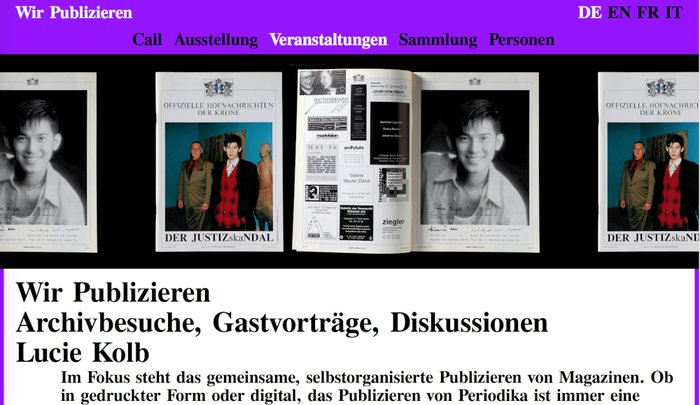 NewsWednesday | 6 February 2019
NewsWednesday | 6 February 2019„Wir publizieren“ – Master-Studio School of Visual Combinations
Projekt des Fachbereichs KuD der HfK mit der HKB zum Herausgeben, Vervielfältigen und Verteilen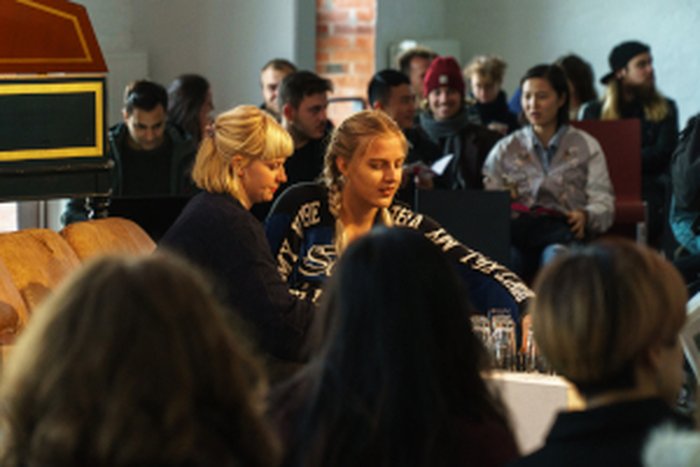 ReviewWednesday | 10 October 2018
ReviewWednesday | 10 October 2018Feierliche Semestereröffnung
225 Erstsemester starten in das Wintersemester
